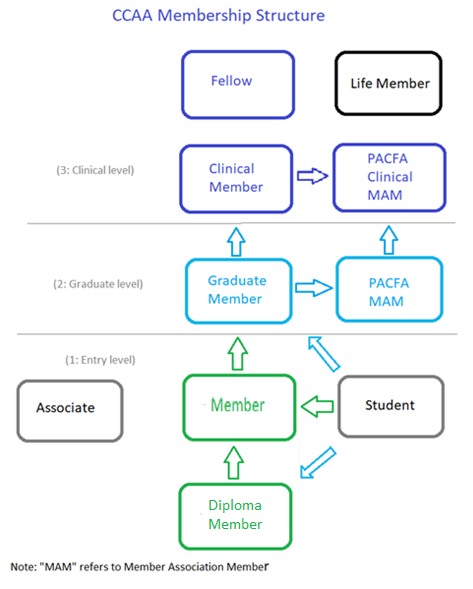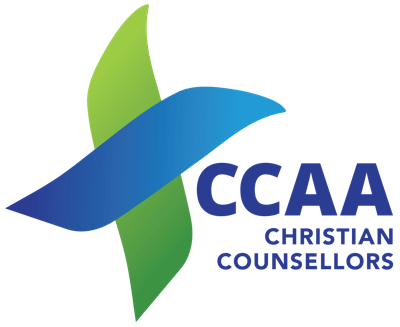About Our Memberships
CCAA offers different types of membership based on qualifications and experience. The specific requirements for each CCAA Membership category are detailed on each individual membership application form and are also summarised below.
All Registered Members are bound by the CCAA Code of Ethics and must satisfy ongoing annual professional development and clinical supervision requirements.
Registered Members whose basic training meets PACFA’s training standards can also join PACFA, by virtue of their CCAA membership. Once a PACFA Registrant they will be automatically listed on the ARCAP Register.
How do I join
For ACA members: CCAA is offering a special limited time offer until 31 December 2024 to ACA members who wish to transfer across to CCAA. For further information please click here.
Please consult the chart below about CCAA Membership levels and click here to compare the full details of our Membership levels. If you already know which level of membership you wish to apply for and you wish to join, click here.
If you have completed your training via a pathway that differs from those outlined below, this does not mean you are ineligible to join CCAA, you can still apply through our RPL process. Please contact the National Office to discuss the RPL options.
If you are unsure whether your qualification satisfies the membership requirements you wish to apply for, please contact our National Office on: 08 7099 2277
CCAA is a distinctively Christian Professional Association, committed to integrating our Christian faith with our professional practice. We expect our members to be Christian disciples of Jesus Christ.
For every level of membership CCAA also requires:
- Profession of faith in Jesus Christ through agreeing to the Apostles Creed
- Participation in a church or Christian faith community.

Create a user registration to apply for a CCAA Membership Today!
Registered Members
click for details
Diploma Member
The basic training requirements for a Diploma Member are completion of a AQF level 5 Diploma from a Registered Training Provider accredited with ACA.
Diploma members may hold a professional position providing counselling, pastoral counselling or client support as an employee of a church, parachurch or social welfare agency and can advertise their CCAA Membership when applying for this type of employment.
CCAA does not regard a Diploma as providing adequate training to enable a counsellor to work independently in private practice, and recommends that Diploma members do not do so until completing further training. Diploma members are encouraged to undertake further training in counselling.
They cannot advertise themselves on the CCAA Find-a-Counsellor search engine, which is for counsellors in private practice.
A Diploma does not satisfy PACFA training requirements, so a Diploma member is ineligible to join PACFA.
Member
It is open to VET trained counsellors who hold an AQF level 6 Advanced Diploma, or a AQF level 8 Graduate Diploma from a Registered Training Provider accredited with either ACA or PACFA.
Registered members at this level of membership are not qualified to join PACFA.
The course must include a counselling practice practicum. If your course does not include a practicum, then CCAA will give you probationary membership until you have completed 40 client contact hours and 10 hours of supervision with a CCAA Accredited supervisor.
Members qualified with an Advanced Diploma or Graduate Diploma may practice professionally as counsellors either in private practice or as employees.
They may promote their CCAA Membership publicly and may also advertise their services on the CCAA website under “Find a Counsellor”.
Graduate Member
The basic training requirements for Graduate Membership are completion of a Bachelor Degree (AQF level 7) or Master Degree in Counselling, Psychology or Social Work (AQF level 9).
There are FOUR qualification pathways for Graduate Membership:
- Completion of a Bachelor Degree or Masters Degree in Counselling from a Registered Training Provider that either is accredited by PACFA as satisfying PACFA basic training requirements, or is accredited by ACA, or their equivalent.
The course must include a minimum of 40 hours of face-to-face counselling or psychotherapy practice (client contact) with 10 hours of supervision (related to client contact). - Allied Health Practitioners who are registered with AHPRA as either a Registered Psychologist or Registered as a Clinical or Mental Health Social Worker with a Medicare Provider Number, who have completed either a AQF 7, 8, 9, or 10 accredited qualification in either Psychology or Social Work.
- Overseas qualified professionals in either counselling, marriage and family therapy or psychology who have (a) completed basic training in an equivalent course at AQF 7 or higher, (b) from an overseas accredited tertiary training institution, (c) is a professional registered member or qualified to be a registered member of a corresponding professional association in either counselling, marriage and family therapy, social work, or psychology. CCAA may require that your overseas qualifications are assessed by VETASSESS.
- Completion of a Graduate Diploma in Counselling that includes a practicum of at least 40 client contact hours and 10 hours of supervision, in addition to an undergraduate degree in psychology, social work, or discipline related to counselling.
Graduate Members become registered voting members of CCAA and may practice professionally as counsellors either in private practice or as employees. They may promote their CCAA Membership publicly and may also advertise their services on the CCAA website under “Find a Counsellor”. Graduate Members must provide documentation that they are covered by professional indemnity insurance or insurance from their employer.
Graduate Members whose basic training meets PACFA training standards are eligible to join PACFA as a Member Association Member through their CCAA membership.
Clinical Member
Graduate Members can upgrade to Clinical Membership by meeting the following requirements. The requirements for Clinical Membership are:
- Two years professional practice as a Graduate Member.
- 75 hours of supervision linked to 750 client contact hours in professional practice that is post-training completed over a period of at least two years;
Theological Integration requirement: Reflecting the emphasis CCAA places on integration of faith in professional practice, Clinical membership has an integration requirement that can be met in two ways:
5 hours of theological integration development and 4 hours of supervision with a CCAA Accredited Theological Integration Supervisor with the supervision being focused on the integration of Christian faith and theology with professional practice.
Completion of a basic training course required for Graduate Membership that CCAA recognises included a significant integration component. Check with the Office whether your course is recognised.
You can apply to upgrade to Clinical Membership through your portal:
Clinical/Supervisor Member
CCAA accredited supervisors have Clinical/Supervisor Membership The requirements to become an accredited supervisor are:
- Clinical Membership for 3 years;
- completion of supervision training for counsellors or psychologists that is accredited by CCAA, PACFA or AHPRA.
- 10 hours of supervision practice and 2 hours of supervision of supervision by a PACFA or CCAA accredited supervisor.
- To become an Integration Supervisor, in addition completion of a Bachelor or Master Degree or Doctorate in Theology or Ministry.
- Applications to become a CCAA Accredited Supervisor or Integration Supervisor need to be approved by a CCAA Branch Committee.
Clinical/Supervisor Members receive the same benefits as Clinical Members as well as Accreditation as a Supervisor by CCAA, and being able to list their practice on the CCAA website under “Find a Supervisor”.
Fellow
CCAA highly experienced Clinical Membership who wish to remain connected with CCAA are now being offered the option of becoming a Fellow and moving into semi-retirement as an alternative to retiring.
Requirements:
- CCAA Clinical Membership
- CCAA Membership for at least 15 years
- Minimum 65 Years in age
- Recommendation by a Branch Committee as being in good standing in the profession
- In semi-retirement engaged in professional practice no more than 100 client contact hours per annum
Since CCAA is a Member Association with PACFA, its Provisional and Clinical members whose basic training satisfies PACFA training standards can become individual members of PACFA as a Member Association Member (MAM).
Member Association Membership is free for qualified CCAA members. Member Association Members enjoy the same benefits as PACFA individual members. To see these benefits, click the link: PACFA benefits. Member Association Membership includes membership with the PACFA College of Counsellors. It has corresponding categories of membership as the CCAA Provisional and Clinical categories. You can also join separately additional PACFA colleges that you qualify for (and pay the college membership fees).
You can apply to join PACFA as a Member Association Member through this link: PACFA (MAM). You will need to upload a single PDF file of your transcripts of your counselling training courses, and your current CCAA membership certification. PACFA may require your counselling contact and supervision logs. PACFA offers a discount on the application fee to CCAA members applying to become a MAM.
There are no ongoing Member Association Membership fees for CCAA members. These fees are covered by an association fee that CCAA pays PACFA. You will be able to renew your Member Association Membership as part of the CCAA renewal process.
Affiliate Members
Student and Associate (click for details)
Student Member
This level of membership is open to students who are currently enrolled in a basic training counselling course accredited with either ACA or PACFA.
Student Members are not registered members and they are not subject to the CCAA Code of Ethics. Any complaints against a Student Member are to be addressed by their training provider rather than the Association.
Student Members may participate in CCAA PD workshops, Conferences and other activities at membership rates.
Student Membership is not available to Registered Members or other people who are already practicing as counsellors, who may be pursuing higher qualifications in counselling.
Associate Member
Becoming an Associate with CCAA is open to any professionally qualified counsellor, allied health professional, social welfare worker, chaplain, or worker in pastoral ministry, who wishes to become involved with CCAA. An associate may also be a person who has an interest in the counselling profession, but may not have undertaken formal training in counselling.
The requirement for becoming an Associate are: professional qualification or work in a profession or field related to counselling including; counselling, psychology, social work, education, pastoral ministry, or specialist ministry related work.
An Associate:
- May participate in CCAA PD workshops, Conferences and other activities at membership rates;
- Is not a Registered Member of CCAA with voting rights;
- May list being a CCAA associate in his or her CV or resume in support of seeking employment.
An Associate may not advertise his or her counselling services in the CCAA website “Find a Counsellor” or publicly advertise him or herself as a professionally qualified counsellor who is a CCAA member.
For further information on joining CCAA
Compare our membership/affiliation categories
Commence your application.

